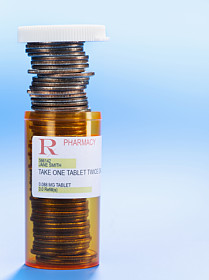AMY ENGEBRETSON
Account Executive, HNI
Health care is too expensive. But what can you do as an individual? While you aren’t going to be able to talk your way out of your premiums, you CAN start taking more control of your costs.
We as consumers (yes, we all are consumers in health care) need to be better and more demanding shoppers. Question your doctor instead of just listening, and when you agree on a treatment plan, follow it. Know what options your insurance carrier offers to help you save money, such as a mail order or half tablet program.
With this list of questions to ask your insurance company and your doctor, you can keep a few more dollars in your pocket.
Prescription Drugs:
- Ask your doctor for a more common antibiotic if you need to take one. The longer the antibiotic has been on the market, the lower the cost (which is why amoxicillin, penicillin and the like are pretty inexpensive.)
- Take part in a mail order program if available for maintenance drugs (drugs you take daily to control an ongoing condition).
- Some plans have prescription half tablet programs where the dose of the drug is doubled and the individual splits the pill in half. This can result in major savings for maintenance drugs.
- While the brand name product might be more familiar, be willing to give lower cost drugs a try before going to a drug that may be in one of the higher tiers on your insurance.
- Take the drug lists from discount programs at your pharmacy to your doctor and ask if there is anything you can try that is less costly for maintenance medications.
Preventive Care:
- Know what your health plan includes for preventive care.
- Health Care Reform included a provision that covers preventative services for many individuals and families. Visit the federal government's informational site to learn more on the new guidelines and to see if you qualify.
Questioning your doctor:
- Major diagnostic tests like MRIs and CAT scans can vary greatly in cost from facility to facility. Standalone facilities like imaging centers or outpatient facilities tend to be significantly less expensive than hospitals. Many carriers also have online tools or customer service lines that will do the work for you.
- Ask your doctor about the specific tests requested. Know why the test needs to be done and how it is going to help you. What is the doctor looking for? Is there another less costly test that potentially could provide the same results?
We as health care consumers are beginning to see more and more tools to shop around for care, just like we shop for anything we purchase in our lives. Not only does shopping around drive personal savings, but it also drives down costs for everyone in the form of lower premiums and more effective care. Check with your insurance carrier to learn what help they can offer with the process.
As consumers, we should be in the driver’s seat – not watching helplessly as costs continue to climb. We have the power to hold the provider communities more responsible for how healthcare is consumed and paid for. More consumers taking part in actively controlling costs is how we can all contribute to “change the game” in health care.
.png?width=69&height=53&name=Acrisure%20Logo%20(White%20Horizontal).png)

